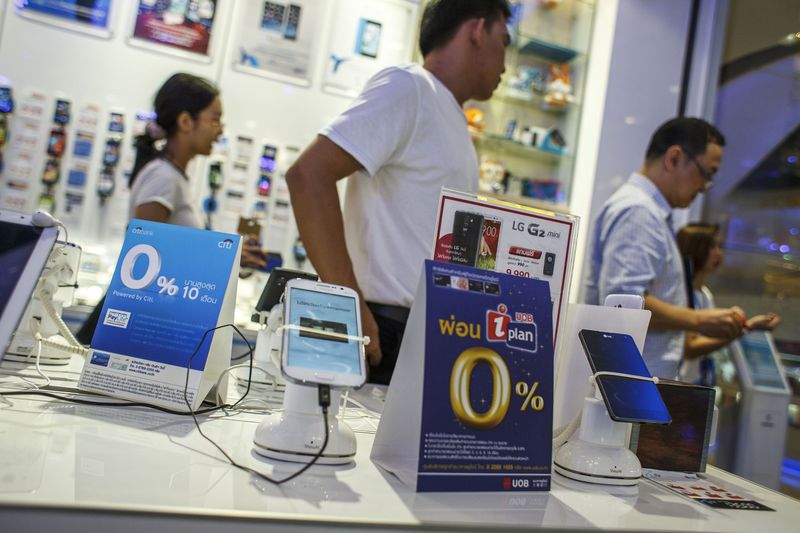By Orathai Sriring and Pairat Temphairojana
BANGKOK (Reuters) - Next month the last batch of televisions will roll off the production line at LG Electronics' plant in Thailand's Rayong province, just east of Bangkok.
The company said on Tuesday that it's moving production 1,500 kilometers northeast to the Vietnamese coastal city of Hai Phong, where labor costs are cheaper and China-based suppliers that much closer.
The move is part of a downward trend for Thailand's once-booming electronics industry, that is struggling to find a foothold in the global supply chain for modern technology like smartphones and tablet computers. In January, the country's manufacturing index fell for the 22nd consecutive month, with production of goods like televisions and radios down 38 percent year-on-year.
The decline is raising concerns that Thailand's economic slowdown is not a temporary problem caused by its political upheaval but a structural one caused by the manufacturing industry's failure to adapt and the increasing attractiveness of its lower-cost neighbors.
"It's time for products with high technology but nobody has invested in them here," said Visnu Limwibul, chairman of the Thai Electrical, Electronics, Telecommunication and Allied Industries Club.
Electronics is Thailand's largest export sector, making up about 15 percent of the total, and is crucial for a country where goods sold overseas are equal to over 60 percent of its economic output.
The country is the world's second-biggest maker of hard disk drives (HDDs) after China, with Western Digital (NASDAQ:WDC) and Seagate Technology (NASDAQ:STX) among the big producers based there. But HDDs, used mainly in PCs, are being displaced by solid state drives (SSDs), which store data in flash memory chips and are used in products like ultra-thin computers and tablets.
Thai exports of HDDs rose 5.8 percent in January year-on-year although those to China slipped 21 percent.
Makers of SSDs and other, more cutting edge technology, are looking to new markets to base their production.
CHEAPER NEIGHBORS
Samsung (LONDON:0593xq) Electronics Co. Ltd has opted to site two large smartphone factories in Vietnam, and made around $11 billion worth of investment pledges into the Vietnamese economy in 2014, according to government newspaper Dau Tu.
In 2009, Vietnam's electronics exports were worth $2.8 billion, a tenth of the size of Thailand's. Last year they had reached $37.3 billion, compared with Thailand's $33 billion.
Vietnam's lower wage costs - the minimum wage there is around $6.35 a day compared with $9.14 in Thailand, according to the Kasikorn Research Center - and the government incentives to lure producers are behind its appeal. Microsoft Corp (NASDAQ:MSFT), Canon Inc and Intel Corp (NASDAQ:INTC) have all set up facilities there in recent years.
Thailand's electronics industry has been looking at ways to reinvent itself.
Thai Delta Electronics said in October that it had produced electronic converters for hybrid cars for the first time, complementing Thailand's still relatively strong auto sector.
But economists say this is not enough, and while it is trying, the country is not as nimble as other low-cost economies to adapt to newer types of technology.
Thailand's innovation ranking in the World Economic Forum's Global Competitiveness Index, fell to 67 in 2014 from 33 in 2007.
"When you look at the context of the continuous decline, you see there is a structural competitiveness problem that has been eroding Thailand," said Santitarn Sathirathai, senior economist of Credit Suisse (SIX:CSGN) in Singapore.
That means hopes Southeast Asia's second-largest economy can achieve an expected long-term average growth rate of around 4.5 percent to 5 percent a year are likely to be dashed.
"Going forward, the new normal for Thailand growth is probably more around 3.5 percent, that is the signal we take on the continuous decline in the industrial sector," said Santitarn.
